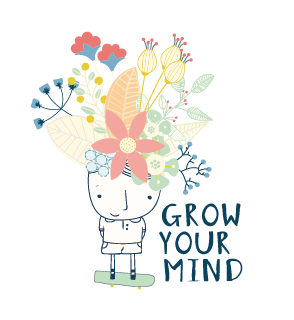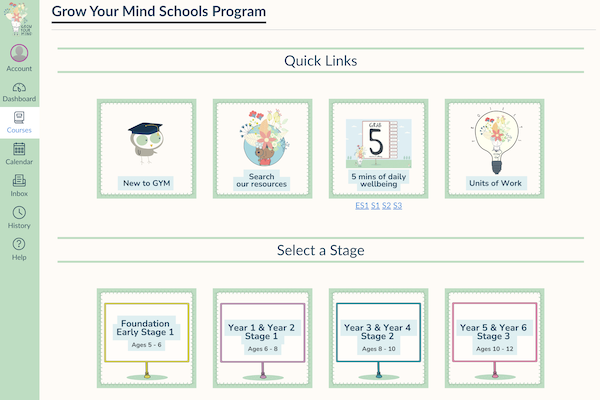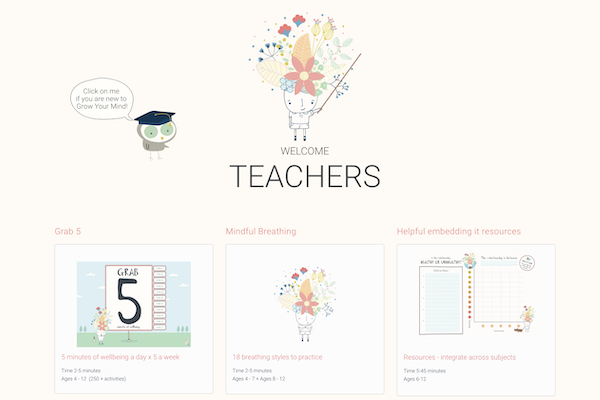
I love to run. It’s never fast. It’s never stylish. But since I was a child I have delighted in it and I have been addicted to how I have felt during and after a dash outside. In fact, I crave the feeling of it and genuinely get excited the night before a run. Jogging brings me joy. It has always been a key part of maintaining positive mental health. Running and jumping in the ocean are two of the things that make me feel most alive.
When I run and swim, I feel a deep and authentic connection to all the things I am thankful for. I remember friends and family that are no longer with me, I breathe, notice the views, listen to my feet as they shuffle along, take delight in people’s faces as they see my two shaggy giant dogs bounding towards them. And the moment my body is submerged in the ocean I feel a vibrancy that is electrifying. It is hard not to burst out into song and I confess I often do.

Grow Your Mind teaches kids, educators and families about the multiple ways we can protect, nurture and look after our mental health. Jumping in the ocean and running are not the only messages! However, another confession, along with breaking into songs upon hitting the ocean, is that I have relied heavily on these two things throughout my life. And so, when I found myself with full thickness burns on both of my feet and in a position where lying down was the only comfortable place to be for 6 weeks, as well as orders to not go anywhere near the ocean, I had to dig deep.
Dr Helen Street, an applied social psychologist and a person we admire hugely at Grow Your Mind states that wellbeing is more of a feeling and as such something you cannot really teach. Hand on heart though, if I had not ‘learnt’ about the following 3 strategies, my own wellbeing would have suffered enormously. I recorded a ‘Cheeky Chat’ on our Grow Your Mind podcast and in it I shared these strategies as well as on The Wonders of Wellbeing podcast.
Before jumping into them a few reminders from the land of Grow Your Mind. We are passionate about reclaiming the term ‘mental health’. It is not just the absence or the presence of ill health. Instead we believe that in much the same way we all agree to having ‘physical’ health, we also all have mental health. It can be brilliant, ordinary, terrible and somewhere in between. Throughout life we travel along the mental health continuum.

And poor mental health is not something to be ashamed or afraid of, so long as we know how and where to get help. Interestingly, the Dunedin Study uncovered how living a life free from mental illness is actually far less common than we may have once thought. The study has closely tracked every aspect of the lives of 1037 people born in Dunedin, New Zealand in 1972 and 1973. Head of the study, Professor Richie Poulton and colleagues found 83% of people experience some form of mental illness by the age of forty. My friends and family secretly suspected that my own mental health would spiral towards struggling and even feeling unwell. However, these three tools kept my hope, humour and mood in tact.
- 1. Focusing on what I could control
Jim Stockdale was fighting in the Vietnam War, when one day he found his helicopter crashing to the ground in a remote village. He was immediately captured, beaten and placed into the infamous Hanoi Hilton, a prisoner of war camp. Stockdale spent over 7 years being tortured, living in solitary confinement, starved and watching his friends die around him. Despite this experience, Stockdale went on to live a life of purpose and enjoyed healthy relationships. He lectured in stoicism and ran for Vice President of the United States of America. Stockdale was asked how he had managed to keep himself sane. His response was an ability to separate what he could and could not control. I for one, can’t imagine how much Stockdale could ‘control’ in that environment but this is what he said:
Can control: My opinions, my aims, my joy, my judgements, my own good and my own evil..
Could not control: My station in life
We share this story with educators across the country and globe and ask them to reflect on what separating what you can and can’t control looks like in their life.

And so I decided to try out this practice on myself. Every time I felt pain, frustration or found myself ruminating on unhelpful thoughts I absolutely would allow myself to feel it all and then I asked myself: Is this something I can control? Followed by, what can I control? It came back to the same answer every time: How I treat others around me today. It was a game changer and a mood saver.
- 2. Spending time with animals
I have always loved animals and adored being in their company. However, over this period I became relatively obsessed and adopted a mindfulness practice around being with them. I invested in more animals for a start. Third confession coming here: I may have gone slightly overboard. 2 goats, a new puppy, 3 rabbits etc The point was not the quantity though, it was just thinking about them, pondering over their needs, mindfully patting them, marveling at their fur and unique personalities.

Articles have been written and research has been explored as to why and how animals can positively boost your mental health. Powerful stories of survival have been attributed to animals too. Take Sam Bloom, who we spotlighted on our Guess Who character strength platform. Bloom was an incredibly active, sporty and fit mother before falling from a balcony in Thailand. Bloom’s skull was fractured in various places. Both her lungs were ruptured and her spinal cord was shattered, leaving her paralysed from the chest down for life. Returning home, Bloom lost the will to live and had it not been for a magpie she may have stayed that way. Penguin Bloom, the magpie that was rescued by Bloom’s son and adopted by the family, has been attributed to the saviour that brought their family together and gave them all a reason for hope and humour again.

Playdough image of Sam Bloom and her bird Penguin
Taking care of Penguin enabled the focus to shift away from Sam’s injuries and instead into helping and bonding with their cheeky bird. For me, delighting in our animals’ existence was another game changer and mood saver
3. Listening to music
I have always been a fan of a tune, singing along, listening, playing, watching musicals. But during this time I made a habit to play more music throughout the day. I could walk on the side of one foot and tiptoe on the other so there was no reason to call this anything other than interpretative dancing! I like to be joyful in the morning. I didn’t have the same capacity for it, so the music did it for me. I was excited to see the contagious nature of playing music on everyone’s moods. It would stop our 5 year old mid tantrum, wake up our pre-teen and get our quiet 9 year old out of his head and into his body.
At Grow Your Mind we have created 7 wellbeing songs as a way to achieve the above as well as reach kids who may not have engaged with our messaging yet. Music is a mood booster. A recent systematic review and meta-analysis of 26 studies comprising 779 individuals found that music interventions were associated with statistically significant and clinically significant changes in mental health. The evidence suggests that music has an ability to promote wellbeing and health-related quality of life (HRQOL). Our songs are daggy, catchy and playful. You cannot help but smile or at least wake up to life when you listen to them. And for me, much like patting an animal and focusing on how I treat people around me – listening to music became my final game changer and mood saver.

News flash on 2 things! I am not comparing my small, insignificant injuries to being a POW or becoming paralysed. The point I am highlighting is drawing on the lessons from others and applying them to my current situation. And the second point to make: There are still multiple ways to nurture and take care of your mental health. We have a physical poster that schools and homes display, inviting kids to touch on one of the strategies that they plan to use that day.

If you would like your own Take Care of Your Mind poster for home or classroom, we are offering 50% off for a limited time. Just use code 3things at checkout.
We also have an award winning Grow Your Mind podcast with 20 episodes across 3 seasons where children share various ways that we can take care of our mental health, feel resilient and boost our moods. I called on 3 strategies to save my mental health at the start of this year. I am now back to running and ocean swims but the blessing has been that delighting in animals, listening to more music and reminding myself to let go of what I cannot control are now well and truly in my tool belt of coping skills for life. The hope from us here at Grow Your Mind, is that young and old continue to add to their own tool belts.
May we all remember that we have options that are helpful when things go pear shaped.


